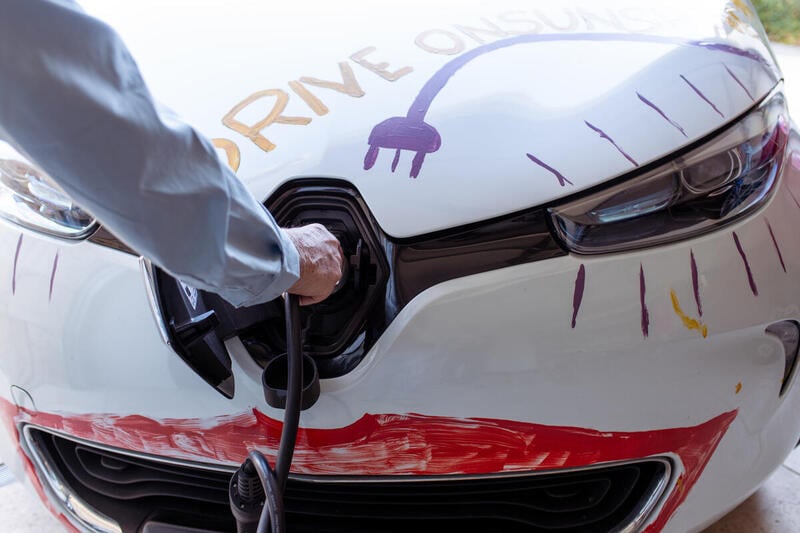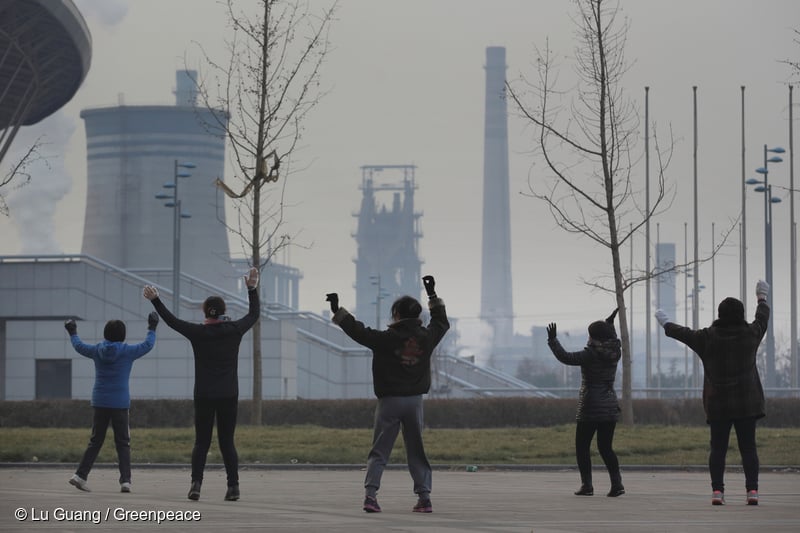TAIPEI, September 27, 2023 — Greenpeace East Asia held a press conference today in front of the Presidential Office, featuring a massive “Net-Zero Snail,” to highlight the lacklustre renewable energy targets set by current presidential candidates. Greenpeace’s new poll [1] indicates that nearly 90% of voters are influenced by a candidate’s stance on climate and energy policy, and most want to see plans for progressive renewable energy development. Greenpeace calls for candidates to commit to a renewable energy target of 40% by 2030, allowing Taiwan to catch up with the international net-zero race and to secure competitiveness in the global economy.
Li Hsin Chang, Greenpeace climate and energy campaigner, stated, “The candidates’ passive approach to renewable energy policy is akin to a giant snail crawling slowly in front of the Presidential Office, making any progress toward the net-zero end goal painfully slow. This shows that candidates are neglecting the high expectations voters have for climate policy.”
A joint survey conducted by Greenpeace reveals that almost 90% of Taiwan’s population consider climate policy an influencing factor in their voting decisions. Nearly 85% support Taiwan moving toward net-zero emissions. The most desired climate policy from candidates is “encouraging and supporting the research and use of renewable energy.” [2]
According to the International Energy Agency (IEA), to achieve net-zero by 2050, 60% of energy must come from renewable sources by 2030. Currently, Democratic Progressive Party nominee Lai Ching-Te has proposed a 30% target; Kuomintang nominee Hou You-Yi suggests 27%; and People’s Party nominee Ko Wen-Je has mentioned a clean energy target of 40% but has not clarified the renewable energy component [3]. Independent candidate Terry Gou’s target is only 15% by 2025. All these targets fall short of international standards, putting Taiwan at risk of failing to achieve net-zero by 2050.
The European Union, Japan, and India have raised their 2030 renewable energy targets to nearly 40% or higher. Australia, Germany, and the United States have even set ambitious targets of 80% for 2030. This indicates a growing global focus on renewable energy development. Greenpeace urges candidates to propose specific policies to raise Taiwan’s renewable energy share to over 40% by 2030 to align with international trends and achieve net-zero by 2050.
Li Hsin Chang further commented, “The development of renewable energy is a decisive factor in the global net-zero race. Without more proactive policies, Taiwanese businesses risk losing competitiveness in the green supply chain, impacting economic growth.” The strengthening of ESG reviews by major investment funds and the potential imposition of carbon tariffs by the US and EU as early as 2024, especially for the semiconductor industry, which must meet RE100 targets, all underscore the urgent need to enhance renewable energy development.
Greenpeace calls on presidential candidates to respond to the high expectations of the public regarding climate policy and renewable energy development, to raise the 2030 renewable energy target to over 40%, and to propose proactive policies to catch up with international progress, getting rid of the “slow-snail” image and moving full speed toward “Net-Zero.”
ENDS
Notes

For onsite photos and survey reports, please scan the QR code to access the cloud folder.
[1] The “2023 Public Attitude Survey on Climate Change Issues” was conducted by Shanghua Market Research Consultants Ltd., targeting Taiwanese citizens aged 20 and above, with a total of 2,224 valid samples from August 8 to September 8, 2023.
[2] The top three climate policies voters want from candidates are “encouraging and supporting the research and use of renewable energy,” “tightening corporate carbon emission standards and imposing fees,” and “conservation and management of forests, soil, and marine carbon sinks.”
[3] People’s Party nominee Ko Wen-je proposed a combined renewable and nuclear energy target of 40% during a TV interview on August 21, 2023, revising his original statement of a 40% renewable energy target announced on August 9, 2023.
Contacts
Communications Officer Joy Chiang [email protected] 0987896179
Climate and Energy Campaigner Li Hsin Chang [email protected] 0923322458



